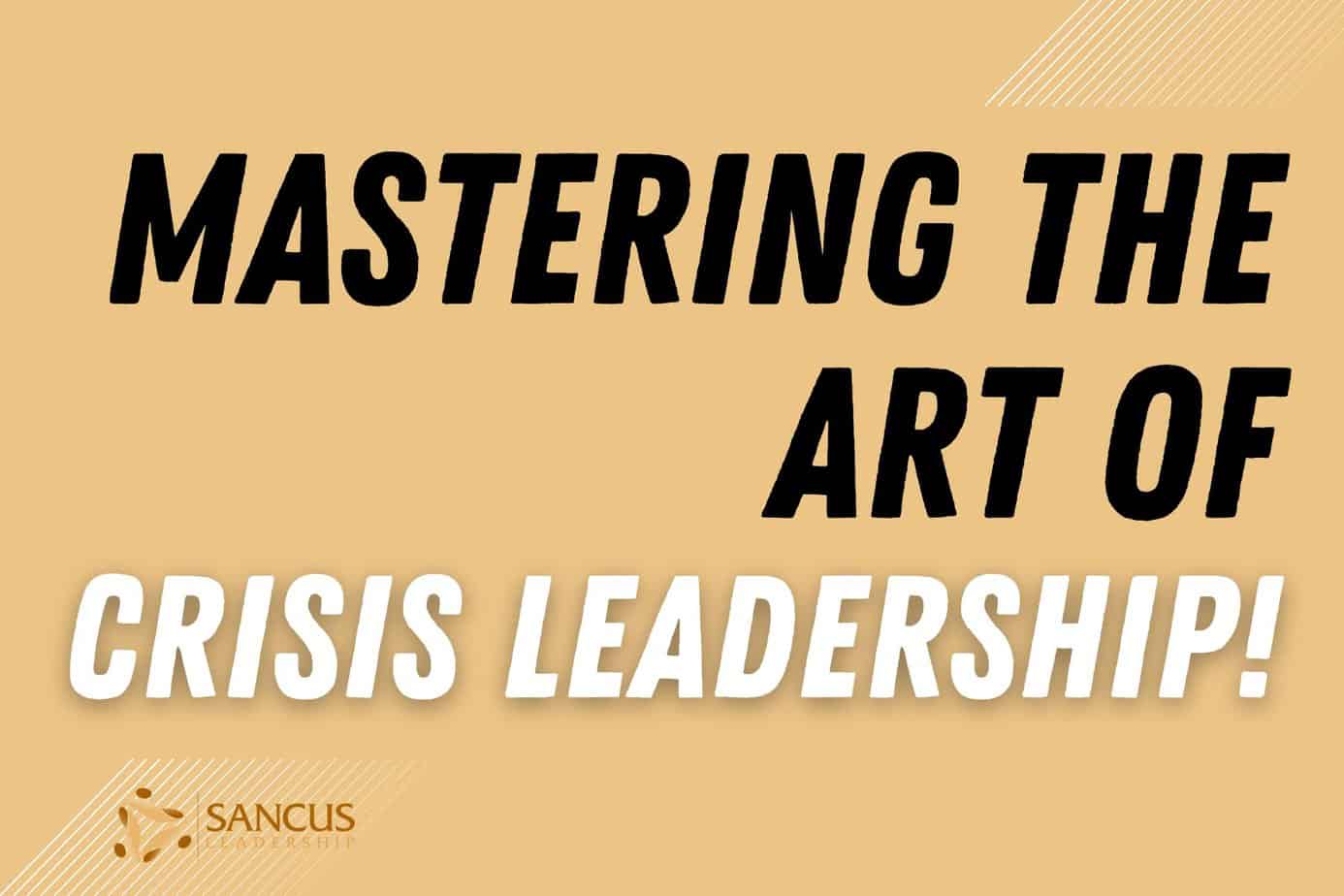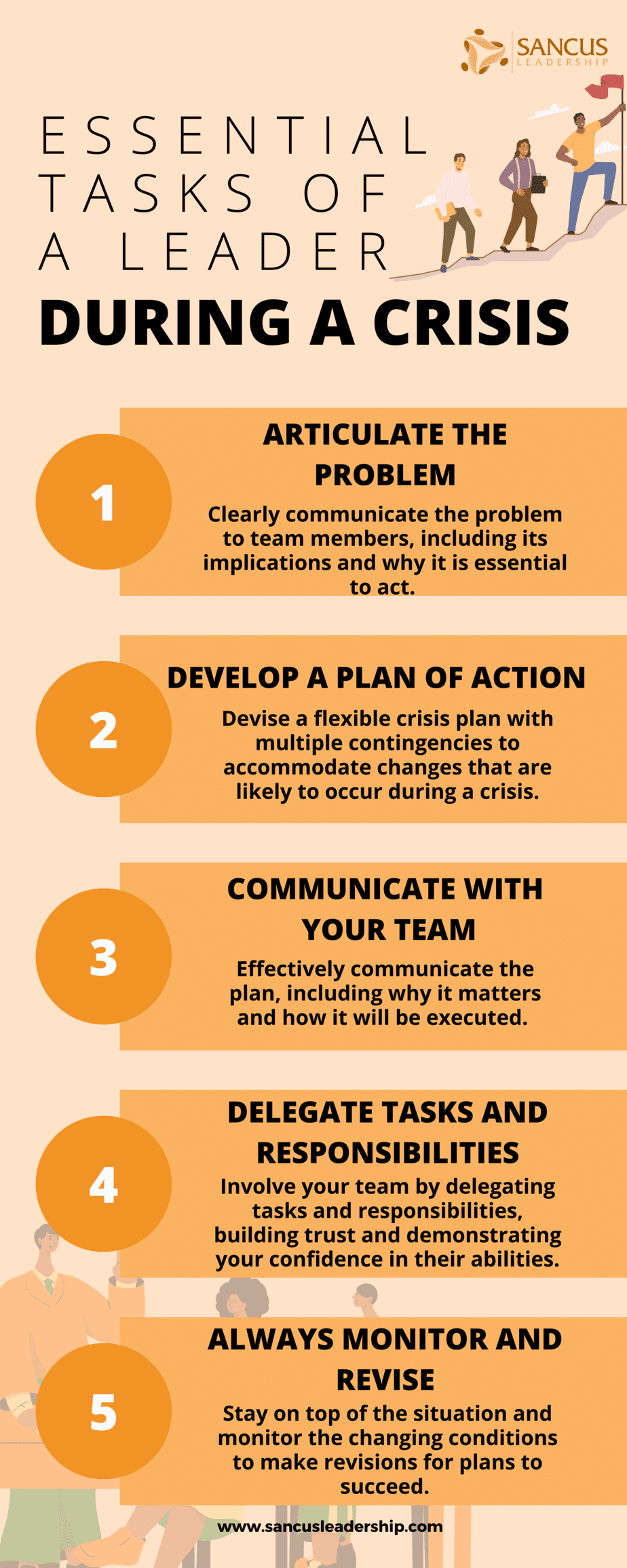Your cart is currently empty!

Master Crisis Leadership! (Tasks, Roles & Experiences)
One thing the military does exceptionally well is being prepared for emergencies. For every process, there is a contingency plan in case of crisis. But no matter how good your processes and standard operating procedures are, it usually comes down to the leaders’ ability to successfully handle the situation. Drawing from 20-plus years of crisis management, what should the leader do when times get rough?
During a crisis, a leader’s role is to ensure the team’s safety while providing clear communication and direction. A leader’s tasks include analyzing the situation, making decisions, and executing the plan. Leaders should also show compassion and empathy to maintain the trust of their team.
Leaders who successfully manage to navigate a crisis usually come out the other end much stronger, having forged deep trust in their team.
Leaders who successfully manage to navigate a crisis usually come out the other end much stronger, having forged deep trust in their team.
This article will discuss a leader’s roles, tasks, and responsibilities during a crisis and the importance of leading and managing your team.
What Is the Role of a Leader During a Crisis?

When crisis strikes, the role of a leader is to ensure the safety of those involved and communicate in a clear, concise manner. Leaders should also assess the crisis, quickly make decisions, and help their team adapt. Providing emotional and other support is vital throughout the crisis.
A crisis can be a turning point for any company or organization. And it’s critical to have someone leading and managing employees during this time. Leading during a crisis should be simple. This is not to be confused with easy because it is not.
But it can be a rewarding experience to have the trust of your team while guiding them through this trying time.
Leaders play a critical role during a crisis because they will be responsible for the following:
- Safety and order: The first step as a leader is to ensure everyone in your group is safe and keep everyone focused while assuring them you will lead them out of the situation. When people get stressed, they tend to forget the rules that make everyday situations work. It is our responsibility as leaders to ensure that everyone on the team remembers to take care of the basics, even during tough times.
- Emotional support: Not everyone deals with crises the same. And as a leader, you need to provide reassurance and emotional support for those who need it. Build trust with your team by being present, accountable, and approachable.
- Communication: It is essential to be clear and specific in your communication with honesty about the situation and its severity. Provide reassurance by showing them you have control and you are there to support and guide them. You also need to communicate how this affects you so that they can help themselves by helping you.
- Direction: Emergent situations will cause tension and emotional chaos in the workplace, so it’s crucial to assign responsibilities and keep the focus of your team members. By providing clear direction, there’s little room for misunderstanding and confusion within your team.
- Decisions: During a crisis, you should also be prepared to make tough decisions, as the safety and well-being of your team may depend on it. You must be able to assess the situation, quickly make decisions, and take action. A good enough decision in time beats a perfect decision too late, every time.
- Adapting: Previously constructed strategies won’t always pertain to the crisis at hand or its entirety. So, it’s crucial for you as a leader to analyze the situation and quickly recognize potential issues. Take action to revise the plan and adapt to the situation to keep the moment up.
Leading your team through a crisis will take a lot of work on your part.
Not only must you often make difficult and quick decisions, but you may deal with stress and anxiety while managing the emotions of your team.
However, you can successfully help your team through a crisis with the right skills and support.
Characteristics of an Effective Leader

Not everyone is suited to manage and lead a team through a crisis matter. You must know your strengths and strengthen your weaknesses.
The only way to know if you are prepared to handle a crisis is to test your leadership in challenging situations. This is what my team and I at Sancus Leadership are experts at.
When you are ready to crisis-proof your leadership so that you can take care of your people when they need you the most, I invite you to contact me here!
An effective leader should possess the following strengths and characteristics:
- Excellent communication skills: Transparent communication with your team will help build trust with those you lead. It’s crucial to keep your group up to date on the crisis while providing emotional or technical support.
- Thrive under pressure: An effective leader should possess strong problem-solving skills under time constraints. Quickly anticipating issues, making decisions, and taking action are vital during times of uncertainty and chaos. You should also be able to adapt your plan to changes in the situation.
- Compassion and empathy: You must be compassionate and empathetic, understanding and caring for those struggling. You’ll have to put your own needs second and focus on the needs of those around you. Your role as a leader is to provide reassurance to those who are feeling stressed, uncertain, or scared in the midst of the crisis. Over-stressed employees perform horribly, further adding to the complexity of the issue.
- Optimism and confidence: If you are a valued leader, your attitude and outlook will have a great deal of influence on the mood and perspective of your team. Practical optimism (i.e., being a problem solver, not a cheerleader) and confidence will keep everyone focused on the 5% of tasks and responsibilities that actually matter during the crisis.
- Trustworthy: You can build and maintain trust with your team through encouragement, collaboration, and setting clear expectations. This also entails you taking the time to truly listen and understand your team’s concerns and ideas. Ensure that your team has the resources and support they need to succeed and be accountable. Make commitments to your team and honor them!
Your role as a leader is to provide reassurance to those who are feeling stressed, uncertain, or scared in the midst of the crisis. Over-stressed employees perform horribly, further adding to the complexity of the issue.
What Is the Leader’s First Responsibility During the Crisis Stage?

The leader’s first responsibility during the crisis stage is to restore safety and minimize damage. Emotions and tensions are high, and you must effectively communicate with your team to keep them calm. This includes answering questions and providing support to the group.
Many types of crises can impact a business; financial, personal, organizational, or technological. Crises can either be antagonistic or not, meaning that humans are the enabling factor behind the threat. A cyber attack is an antagonistic threat, while flooding caused by heavy rain is not.
The first phase of the crisis starts as soon as the incident appears. Your goal now is to minimize damage to personal and business, in that order.
You minimize damage by adhering to the following principles (in order of priority);
- Remove the asset (lead database) from the threat (online hacker attack)
- Remove the threat from the asset and/or
- Destroy the threat
Once your team is sufficiently safe and you’ve minimized the immediate threat, it’s time to get to work with managing the situation and leading your group in the right direction.
Essential Tasks of a Leader During a Crisis

When a crisis strikes, many obstacles are outside of your control, but others are looking to you to get through this rough time. Take ownership and following these steps will help build confidence and trust with your people:
- Articulate the problem.
- Develop a plan of action.
- Communicate the plan with your group.
- Delegate tasks and responsibilities.
- Monitor and revise.
1. Articulate the Problem
A time of crisis is not the time for a leader to shy away from difficult conversations. On the contrary, a leader must be willing to face the problem head-on and articulate it clearly to those they are leading.
This will help team members understand what is at stake and why acting is essential. It’s not just about listing the facts but communicating them in a way that inspires confidence and motivates people to act.
The following are a few things you can do to lead during a time of crisis effectively:
- First, make sure you understand the problem and its implications thoroughly.
- Second, communicate clearly with your team members so they know what’s happening.
- And third, set a clear and simple direction for the team and keep them moving in the right direction.
The tonality of your communication should be persuasive and reassuring. People need to hear that solutions can be found and that you have faith in their ability to achieve them. Demonstrating a positive attitude will demonstrate your commitment to finding solutions and encourage others to do the same.
2. Develop a Plan of Action
Many businesses typically train their leaders on different crisis plans in place, but sometimes the plans won’t align with the crisis you’re experiencing. In this case, you should be able to devise a plan and take action quickly.
This is probably one of the most vital skills of a successful leader in rough times.
In the EOD teams, we analyze every plan from three perspectives; the best, the worst, and the most likely outcome. Then we create contingency plans for the worst outcome, and we plan on how to improve our chances for the best outcome.
Remember, one of a leader’s roles is to be able to make decisions and adapt as quickly as possible. You want to create a flexible crisis plan with multiple contingencies to accommodate changes that are likely to occur during a crisis.
But most importantly, the plan should include practical steps to ensure the safety of the assets and provide direction and responsibilities for team members to keep focus.
The plan should also include how you will communicate with your team, how they can communicate with you, and how you will communicate with your superiors and outside parties. And incorporating a support system (emotional and guidance) will help keep the tension low during this stressful time.
Once the plan is in place, taking action and staying committed to the process are vital.
3. Communicate With Your Team
Effectively communicating a plan is essential for the success of the plan and your leadership. After all, how can you expect people to follow a plan if they have yet to hear about it or understand what it entails?
Your team will lose their confidence and trust in you as a leader if you cannot communicate effectively.
The key to effective communication is presenting your message to resonate with those on both sides of the conversation. Make sure that not only do you clearly explain your strategy but also ensure people understand why this plan matters. And this is especially true if the plan involves taking some risk.
Tell people what to do and when to do it, but stay away from telling them how unless you really really have to.
Tell people what to do and when to do it, but stay away from telling them how unless you really really have to.
If done correctly, then unambiguous communication will help develop trust between yourself and your group, which fosters motivation towards achieving success as part of a team effort.
4. Delegate Tasks and Responsibilities
Never let ego get the best of you as a leader, especially during high-paced situations. Show your team you trust their abilities and provide them with a clear target and purpose. Delegating tasks and responsibilities is an excellent way to involve your team and build trust.
5. Always Monitor and Revise
Leaders must stay on top of the situation and monitor the changing conditions to make revisions for their plans to succeed. Change during a crisis can happen just as quickly as when the crisis began, so you should be prepared to pivot and reroute your team.
So, it’s essential to monitor how well your plan is working and tweak what isn’t necessary or effective. And while revising your strategy, ensure you stay in tune with your company’s mission and principles. If you don’t assess the plan’s effectiveness and make revisions when needed, it could have costly consequences for you, your team, and the business.
Tips for Maintaining Trust During a Crisis

When bullets start flying, you fight for the guy next to you, not for a flag and not for a country. The same goes for your business. If you do not have sufficient trust in your team, people will quickly abandon the team’s goals in favor of their own interests.
Building trust in your team should be one of your main goals as a leader. Trust is the best predictor of success during a crisis.
The following are some tips on how to keep the trust of your group while leading them through the crisis:
- Be clear and concise: Your team needs to understand the gravity of the situation and what they need to do to help solve it. Be sure to explain things in a way that is easy for them to understand.
- Be positive and optimistic: Maintaining a positive attitude during times of crisis is essential. This will help motivate your team and give them hope that things will improve.
- Be a good listener: To effectively lead your team, you must be open to hearing their concerns and ideas. Listen to what they say and then work together to devise a plan of action.
- Be decisive: Once you’ve gathered all the information, make your decisions and take action. Be confident in your choices, and don’t second-guess yourself. Your team will look to you for guidance, so you must show them you’re up for the task.
- Be supportive: Offer words of encouragement and praise when warranted. And if someone on your team is struggling, be present to support them, whether emotionally or in a technical matter.
- Honor your commitments, and let them honor theirs: Show them they’re valuable by assigning tasks and responsibilities. Ensure they have the support and resources they need to be successful. Always update your team on any changes so they can quickly pivot into a new resolution direction.
By following these tips, you’ll be able to effectively lead your team through the crisis.
| Roles of a Leader During a Crisis | Tasks of a Leader During a Crisis |
| Ensure the safety of those involved | Analyze the situation |
| Communicate in a clear, concise manner | Make decisions |
| Help team adapt | Execute the plan |
| Provide emotional support | Show compassion and empathy |
| Delegate tasks and responsibilities | |
| Monitor and revise | |
| Assign responsibilities and keep focus | |
| Be prepared to make tough decisions | |
| Recognize potential issues and adapt to the situation |
In Conclusion
Whether it’s a natural disaster, security breach, or another emergency situation, your role as a leader is to keep everyone safe and productive when a crisis hits. Always communicate effectively by sharing updates, answering questions, or providing support.
Devise a plan and take action while delegating tasks and responsibilities to your team.
